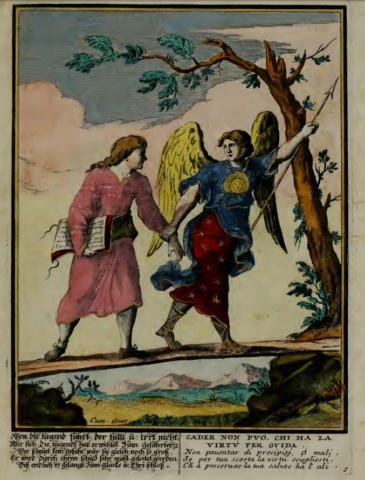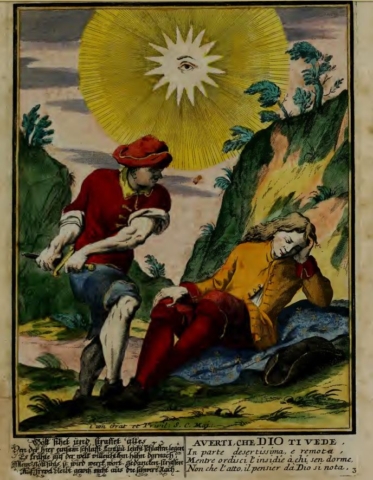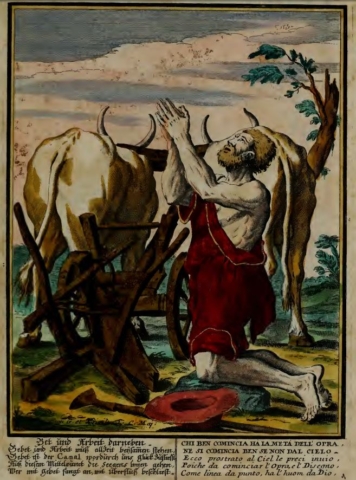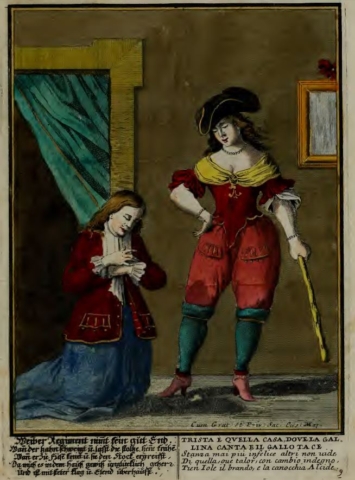As a personal challenge I want to start a series of posts where I try to translate the “Proverbi Figurati” by Giuseppe Maria Mitelli (published in 1678). My Italian language skills are probably at the lower intermediate skills, so don’t expect too much from me (not to mention that this is 17th century Italian).
After I started this post, I found out that you can find the translation of the proverbs on the website of the Metropolitan Museum of Art. However, some proverb translations are incomplete, and the 3 verse texts that follow the proverbs are not translated Also, I am interested in illustrated allegories. I already wrote a few posts about Iconologia (by Cesare Ripa), Mantegna tarot and other topics related to symbolism.
If you are interested in illustrated proverbs I also recommend reading and studying the painting Netherlandish Proverbs by Pieter Bruegel the Elder. Unlike the painting by Bruegel, Mitelli has an illustration for each proverb. I think that there about 48 illustration in Proverbi Figurati. On archive.org you can find the original black and white version and a colored version.
Virtue (Plate 5)
The proverb is “Cader non puo, chi ha la virtu per guida“. My translation is “He who has virtue as his guide cannot fall“. The 3 verse text says
Non paventar di precipizi, o mali,
Se per tua scorta la virtù sciegliesti.
Ch à preservar la tua salute ha l’ali
Do not fear precipices, or evils,
If you choose virtue as your escort.
[That has wings to preserve your health] (I am not sure about this part)
God watches you (Plate 3)
The proverb is “Averti che Dio ti vede“. In English “Notice that God watches you“. The 3 verse text says
In parte desertissima e remota, Mentre ordisci l’insidie à chi sen dorme, Non che l’atto, il pensier dà Dio si nota
In a most deserted andremote place, While you plot to injure a person who is sleeping, Not only your actions, but your thoughts too are watched by God
I found the translation to this illustration in the paper “”Pieter Bruegel the Elder’s Netherlandish Proverbs and Similar Proverbs in Traditional Japanese Art” by Mori Yoko.
The beginning is half of the work (Plate 1)
The proverb says “CHI BEN COMINCIA HÀ LA META DELL’OPRA. NE SI OCMINCIA BEN SE NON DAL CIELO.” The translation is “He Who Begins His Work Well Has Already Finished by Half. One doesn’t begin well if it is not from heaven.” The 3 verse text says
Ecco prostrato al ciel le preci inuio, Poiche da cominciar l’Opra, e l’Disegno, Come linea da punto, ha l’huom da Dio.
Behold, prostrate to heaven sincerely pray Since to begin the work, and the drawing As the line from the point, so the man from God
I have problems translating the 3 verses. I assume that “preci” is related to the Latin “preco”, which means to beg, pray or exhort. Maybe “inuio” is related to genuine or sincere.
Gender Roles (Plate 9)
The proverb says ” TRISTA È QVELLA CASA, DOVE LA GALLINA CANTA, E IL GALLO TACE“. The translation is “Sad is that House Wherein the Hen Crows and the Cock Stays Silent“. The 3 verse text says
Stanza mai più infelice altri non uide, Di quella oué talor, con cambio indegno, Tien Iole il brando, e la canocchia Alcide.
A more unhappy room you cannot see, Than that where sometimes, with unworthy change Iole holds the club, Alcides [Heracles/Hercules] wears the chemise
The proverb and the text talk about the switch in gender roles. The image also shows a woman with pants standing on her feet, while her husband is wearing his wife’s dress and is kneeling before his wife.
The reference to Iole and Hercules is from Heroides 9 by Ovid. In Ovid’s version, Iole made Hercules wear women’s clothing and perform women’s work. As a side note, Hercules was humiliated in a similar fashion by Omphale, the queen of Lydia.




